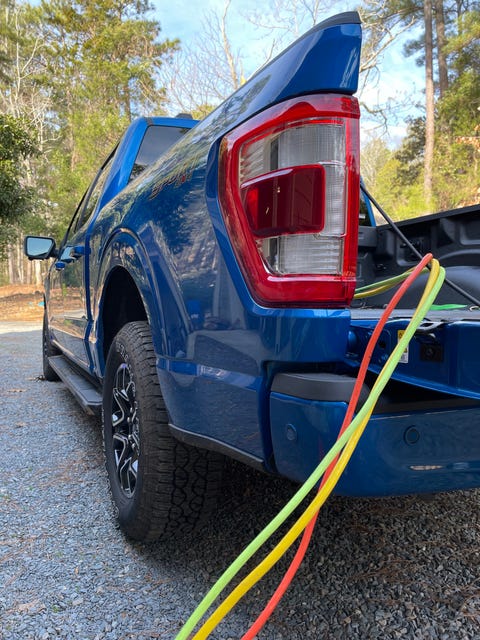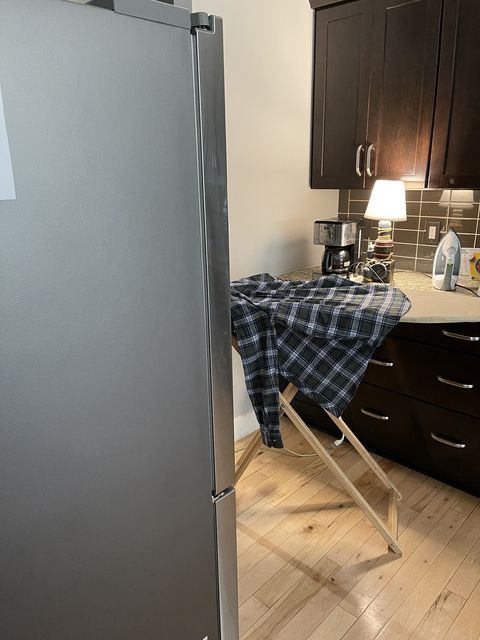begin quote from:
https://www.caranddriver.com/features/a35152752/powered-house-ford-f-150-hybrid/
I Powered My House with the Ford F-150 Hybrid
The F-150 Hybrid's onboard generator produces 7.2 kW of power. So if the power goes out, can you use your truck to power your house? We decided to find out.
Where I live, power outages are a frequent fact of life. Lots of trees coexist with rickety above-ground power lines, until the moment they don't. A few years ago, during Hurricane Florence, we lost power for four days. Fortunately, I bought a little Honda EU2200i generator ahead of the storm. It was enough to power up the essentials. But even with that, I had to choose what to run, and when. If I'd had a 2021 F-150 Hybrid in the driveway, it would have been a different story. Because, given the right extension cords and power strips, the F-150 Hybrid can power your house.
The PowerBoost drivetrain is cool on its own—with 430 horsepower and 570 pound-feet of torque, it's the quickest non-Raptor-engine F-150 we've ever tested, while improving fuel economy by 20 percent—but the onboard generator is the intriguing option. Dubbed Pro Power Onboard, it's available in several different outputs, from 2.0 kilowatts (with the 2.7-liter V-6 and 5.0 V-8) up to a maximum of 7.2 kilowatts with the twin-turbo 3.5-liter V-6. And that latter number is enough to run your whole damn house. I know because I have a 7.4-kilowatt solar array and a net electric meter that tells me whether I'm using grid power or pushing electricity back out. On a sunny day, I'm running my house and sending electrons to my neighbors. It stands to reason, then, that this truck in the driveway could also power my house. So I decided to try it. (There is a third way, but backfilling via a 240-volt plug without a transfer switch, while safe when done properly, adds considerable risk.)
You can use the F-150's generator as your personal electric utility in two ways. In the most elegant scenario, you'd run a cable from the 30-amp, 240-volt outlet in the bed to a 30-amp transfer switch and directly power selected circuits in your house. No extension cords, no breaking out your World's Greatest Dad table lamp to light your kitchen counter. I do not have a transfer switch. So, extension cords it is.
Below the 30-amp plug are four regular 120-volt outlets, and each pair of these is a 20-amp circuit rated for 2400 watts. (There are 120-volt outlets in the interior, too.) That's a lot of power. To safely make the most of it, you need thick extension cords. Which, fortunately, I have. The main one I use in outages is rated for 1875 watts. I have others in various lengths and gauges to construct my own messy indoor power grid. I powered up the truck, plugged in my cords and got to work.
With my Honda generator, I can run the essentials—fridge, some lights, fans, TV—but I might have to unplug something if I want to run a power-hungry appliance like a coffee maker (600 watts) or microwave (1500 watts). To test the F-150, I plugged in as many things as I could think of, all at once: coffee maker, Shark vac, TV, internet modem and router, tankless gas hot water heater, fridge, garage fridge, and a couple lamps. Oh, and while we're at it, let's get the wrinkles out of some clothes with my 1400-watt iron. I don't normally vacuum, make coffee, and iron clothes all at once, but these are the things we do for science.
The F-150 ran everything simultaneously, and could have handled more. I know this because the generator display on the 12-inch dash screen shows exactly how much power you're demanding at any given moment. My various gadgets devoured 3200 watts, which is way beyond the draw that would have caused my Honda to blow its circuit breaker. This is more than half of the power available to 120-volts, but less than half of the system capacity if I were running my house off the 240-volt feed. In fact, the truck seemed bored with this assignment. Occasionally, the V-6 would shut down and leave the truck's 1.5-kWh lithium battery to run the show, resulting in the quietest 7.2-kW generator you'll ever hear. There's a muted whirr from beneath the truck, and that's it.
But, you ask, why wouldn't you just buy a 7200-watt generator? Because if you're buying an F-150 Hybrid, the 7200-watt Pro Power Onboard is a $750 option. (The 2400 watt output, with two outlets, is standard.) You will not get a sophisticated 7000-watt generator for $750. You might find one that sounds like Randy Quaid's lawnmower from the underrated Richard Pryor film Moving, but a modern, quiet inverter generator is going to cost probably twice that. And a 7000-watt Honda—the aspirational luxury brand of generator—goes for about $4500. The F-150 generator is a deal, and you don't have to lug it around, find a place for it in your garage, or worry about the fuel going stale. It's just there, in the truck, whenever you need it.
Ford seems to envision Pro Power Onboard as a tool for contractors or outdoorsy types, running saws on a job site or charging up electric dirt bikes at a remote riding spot. And it can do those things. But when a tree goes down and the lights go out, it could also be the MVP right there in your driveway.













No comments:
Post a Comment